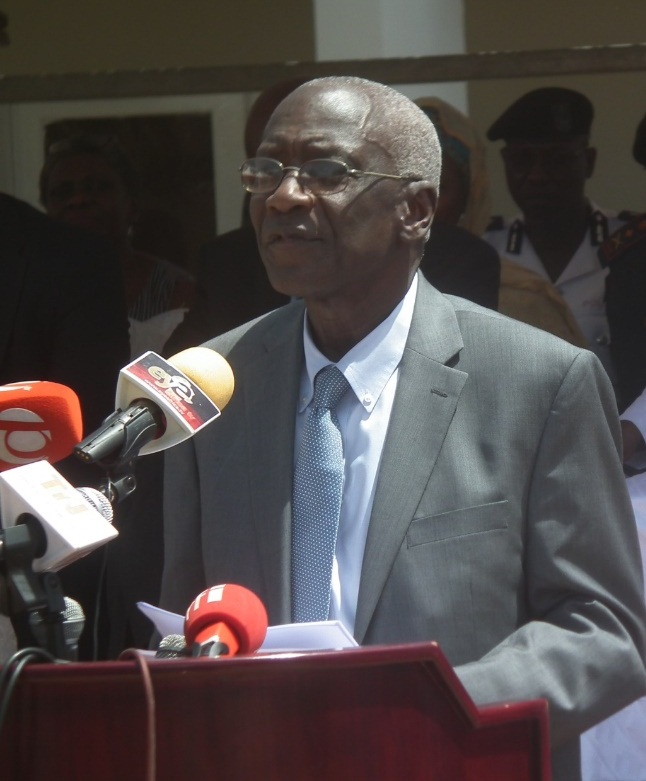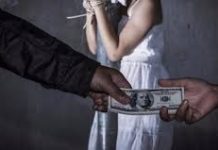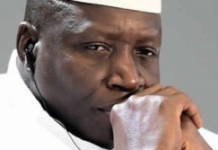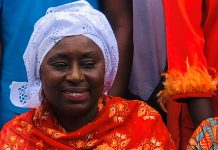By Yankuba Jallow
An anonymous witness, testifying before the TRRC, has explained how ex-president Yahya Jammeh was made the leader of the Armed Forces Provincial Ruling Council (AFPRC).
He said at the time of planning of the coup, no leader was identified. He said after the coup became successful, they wanted to make Major Basirou Barrow as the chairman but he was nowhere to be seen.
He said since Major Barrow failed to show up, the most active personnel in the coup were Yahya Jammeh, Sanna Sabally, Edward Singhateh and Sadibou Hydara.
“These were the people who sat to discuss who should be made the chairman,” he said.
He stated that Jammeh was chosen because he was the most senior among them because he was a Lieutenant whereas the others were 2nd Lieutenants.
He said Yankuba Touray joined and became a member on the 23rd July 1994, which was a day after the coup.
He said the soldiers after staging a successful coup, decided to raise their ranks with the view that ‘a monkey won’t work and a baboon eats’- meaning the juniors won’t work and the seniors enjoy more than them.
Like other witnesses, he said the feeding, transportation, accommodation and salary weren’t good at all. He explained that the quarters that soldiers used as their abode, was a poultry house.
“It was not a hygienic place to harbour soldiers,” he said.
He said accommodation wasn’t enough and some soldiers were staying in the town. He added that the food that was served at the Battalion wasn’t delicious.
He asserted that before the Nigerian soldiers came to The Gambia, the morale in the Gambia National Army was high because it was a new institution where each soldier wants to show high standard. He said at this time, many people were joining the soldier.
He said there was a time when soldiers were deployed to Liberia as 1st ECOMOG Contingent. He added that these soldiers complained that they were not paid their allowances and that the Gambia soldiers who went to Liberia did sell guns to the rebels.
“The government did not address this issue,” he said.
He said the government then deployed the 2nd ECOMOG Contingent and made similar claim and allegation.
He affirmed that both Contingents 1 and 2 held demonstrations for the government to pay their allowances.
“The soldiers were forced to sign a document by the government that they were borrowed money in dollars but the soldiers never received money. The soldiers started to ask for their money,” he said.
In his opinion, the Nigerian soldiers did far better than the British Army Training Team (BATT) which came and helped established the Gambia National Army.
He said one of the biggest achievements of the Nigerian soldiers was in terms of communication. He added that Nigerian soldiers do hold every month lectures for young soldiers who don’t have the chance to go abroad for overseas training.
“They even taught soldiers how to run a government,” he said.
He said the senior soldiers in the Gambia National Army weren’t happy because they felt that their positions were threatened.
“The Nigerians found the Gambian soldiers sleeping and woke them up,” he said.
He said Edward Singhatey, Peter Singhateh, Yankuba Touray, Yaya Jammeh, Sadibou Hydara, Sanna Sabally and others all participated in a meeting held in Kudang where the idea of the coup was discussed.
“The most senior officer in that meeting was Major Basirou Barrow,” he said.
Like the other witnesses, he stated that a day before the coup, some soldiers were disarmed by the Nigerian Soldiers and according to him, this did not go well with the soldiers.
He said he participated in the planning of the coup; that one of the members of the group was sent to go and convince many soldiers to join the coup and that he should smuggle some guns from the armoury at the Yundum Barracks. He said Yaya Jammeh, Edward Singhateh, Sadibou Hydara and Yankuba Touray weren’t part of the meeting held on the 21st July 1994 where the plan of the coup was finalized.
He affirmed that the person assigned to smuggle the weapons and convince people succeeded in his task. He said on the morning of the 22nd July, he met commotion at the Yundum Barracks where soldiers were jubilating and he carried his gun and they headed for Banjul.
He said there was disorder because the soldiers weren’t under a command. He added that vehicles owned by civilians were stopped and taken by soldiers. He said Yahya Jammeh and some other soldiers joined them at Kamalo.
He averred that at the time they were going to stage the coup, many people came out cheering at them.
“I think the people don’t know that we were going to make a coup. Some of the people bought biscuits and ‘wonjo’ for us,” he said.
He explained that when they reached the Denton Bridge, they met Captain Suwareh who later asked his men to join the coup makers following his discussion with Yahya Jammeh. He added that it was Sanna Sabally who asked the soldiers who were with Suwareh to change their berets from grey to black.
“Suwareh joined us without any resistance because there was no hesitation. It was automatic,” he said.
He said as far as he knew, Captain Suwareh did not play much crucial role in the coup apart from only joining them.
“Suwareh did not take command. His claim was ridiculous. No one was commanding because the situation was chaotic. Suwareh was not totally visible,” the witness said.
He said when they reached the State House, a soldier by the name Musa Jammeh alias Malia Mongo opened the door and asked Yahya Jammeh and the troops to come in and they went in without any resistance.
“Our plan was to take over the State House but we have never expected it to be so easy like it had happened,” he said.
He said after the coup, the junta was not feeling comfortable with the soldiers because they thought that soldiers will overthrow them.
“We made verbal agreement before the coup that when we become successful, we should only rule for 2 months and return power to the civilians. The junta knew that the soldiers meant what they agreed and they could do anything to overthrow them,” he said.
He explained that on the 11 November 1994, Edward Singhateh, Sanna Sabally, Sadibou Hydara and Yankuba Touray led a group of soldiers from the State Guard to attack the Yundum and Fajara Barracks with allegations of a coup plot. He elucidated that about 19 to 20 soldiers were arrested and executed by the junta at those Barracks.
He said soldiers wanted to stage a coup because they were let down by the junta.
“The agreement was for them to stay for only 2 months but they saw that the junta was not ready to abide by the agreement and also the junta has failed to promote their welfare,” he said.
Those executed by the soldiers according to the witness included; Abdoulie Faal, Alieu Ceesay, Basirou Barrow, Basirou Camara, Ebrima Manneh and others.
“They were executed on different days,” he said.
“The execution was done in the presence of Edward Singhateh, Sanna Sabally, Momodou Badjie, the current security adviser to President Adama Barrow and Baboucarr Jatta, a former CDS in the Gambia,” he said.
The witness has served the Commission with a list of soldiers believed to be massacred on the 11 November 1994.
The sitting continues today at 9 am.





















